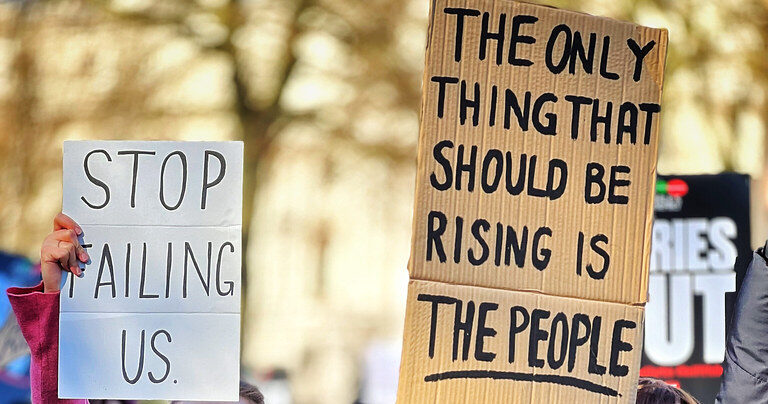

By Jeremy Dewar
The TUC has called a national demonstration for 18 June to protest against the crippling cost of living millions are facing. In towns and cities across the country local trades councils are putting on May Day marches to celebrate International Workers’ Day in unison with socialist parties and unions across the world.
In the unfolding economic crisis, marchers and speakers should use these protests to call for resistance. We are facing not just inflation at a 40-year high and rising, but also a summer recession and, according to the IMF, stagnation (stagflation really) stretching into 2023. Britain will drop from top of the OECD economic table to bottom – and it will hurt.
It is no accident that the UVW, IWGB, and Unite, refocused on the workplace and bolstered by industrial combines under Sharon Graham’s leadership, have taken the lead in winning above-inflation pay rises.
Anything that strengthens workplace organisation, increases rank and file control of disputes and leads to sustained strike action and the spreading of disputes has to be encouraged – and copied by militants in the other unions. Solidarity between the different struggles and organised coordination of them are crucial to success.
Trades Councils
In the past local trades union councils have been the traditional starting point for organising industrial action on a class-wide basis, but many have become moribund, often hidebound by regional and national TUC regulations. Now is the time to brush off the cobwebs, cast off the shackles and get them going again, as is being done in Lambeth, south London.
Where this is impossible due to bureaucratic interference, ad hoc united fronts by the most active unions in the town or borough should link up and call meetings to coordinate resistance to the bosses’ offensive.
Either way it will probably be necessary to set up wider campaign groups that can reach out to and draw in delegates and activists from the wider movement: community groups, the independent unions not affiliated to the TUC but vital for precarious sectors, young people and students, and lively campaigns, like Extinction Rebellion and the Renters Union.
The immediate task is to produce effective campaigning materials – leaflets, press releases, Facebook and WhatsApp groups, posters, etc. Stalls on the high streets, visits to picket lines and leafleting of workplaces will start to identify new activists and mobilise greater numbers as the crisis begins to bite and workers begin to look for answers.
Young people must be key to the strategy. The vast majority may not be in unions themselves but large numbers are already radicalised over climate, Black Lives Matter and women’s campaigns. They are the least infected by routinism and defeatism, so often the way of the trade union bureaucracy.
Our aim must be to orient towards workplaces that are being offered real pay cuts at a time of rising inflation. We need to build solidarity for strikers, so they can stay out longer and spread the action. We need to start coordinating strikes, so they gather momentum and have a greater chance of success. And we need direct action to amplify our message and embarrass the profiteers.
But the struggle is national and international, not local. A new leadership must be forged in the struggles ahead out of the rank and file workers and activists that come to the forefront of the resistance. They will need to wrest control of their actions away from the union officials, who tend to settle too soon for too little, lest the struggle gets ‘out of control’.
For this to happen, local trades councils and cost of living campaigns will need to develop into real councils of action, drawing in delegates from the unions and the community, ready and able not only to strengthen workers’ strikes but also to call them with the authority they have gained.
In other words we need to revolutionise the labour movement root and branch. That is what WORKERS POWER fights for. Join us!